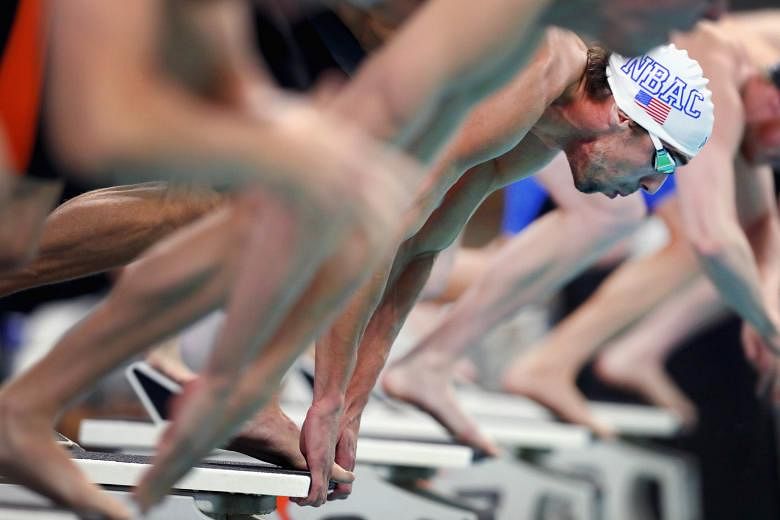OMAHA (Nebraska) • Michael Phelps has 18 golds among his astonishing 22 Olympic medals, but he insists that "nobody is a lock" to make the American swim team for Rio.
"More pressure here than the Olympics for sure," he said of the week-long US Olympic trials, which began yesterday and where only the top two in each individual event will make the team. "It's harder here. Nobody is a shoo-in and nobody is a lock."
Phelps' last Olympic campaign left a sour taste - despite yielding another four golds among six medals in London. "I wasn't happy doing what I was doing," he says of 2012. "I sure as hell wasn't training. I don't like allowing myself to do that, and that was something that haunted me for a while."
Things are different now.
He has emerged from the post-London period of turmoil that included a drink-driving charge and a stint in rehabilitation with strengthened family ties - and with new ones. He and fiancee Nicole Johnson welcomed their baby son, Boomer Robert, last month.
"Fatherhood has been awesome," said Phelps, who is bidding to become the first man to make five US Olympic swimming teams. "When I'm holding him or lying on the couch with him, it's just awesome being able to welcome a new person into this world."
Phelps, who will turn 31 on Thursday, day five of the eight-day meet, is delighted to know that Boomer will see him close out his swimming career - one for which he has renewed zest. "I think I'm just happier, a lot happier doing what I'm doing now," he said.
He added: "This time, it's about trying my hardest, giving it my all. I don't want to live the rest of my life with any regrets."
Much of the credit for this change goes to that stint in rehab at the Meadows, a treatment centre in Wickenburg, Arizona.
In April, an emotional Bob Bowman, his long-time coach, revealed: "I never thought that he would ever change. He hid everything that makes him human for 12 years. The rehab is what opened him up."
Bowman recalled a trip in the autumn of 2014 to visit Phelps during rehab. The trip was a revelation, an introduction to a man stripped of the armour that had helped make him an athletic machine.
At the Meadows, Phelps took him on a tour of the facility, providing thumbnail sketches of the people they encountered. He seemed to know everyone, and everyone returned his greetings in kind with a comment that elicited the guide's generous, rumbling laugh.
Bowman had difficulty reconciling this image with the swimmer who was so deeply absorbed in his own journey that he did not learn the given names of all his team-mates on the 2004 and 2008 US Olympic swimming squads.
Bowman said: "He had a little story about everybody (at the Meadows). I had never seen him like that. I looked at him like, 'Who are you'?"
It is among the questions Phelps sought answers to in rehab. After all, by 2014, it had appeared plain to everyone that the trail he had blazed had veered into a dead end.
"He had no idea what to do with the rest of his life," Bowman said. "It made me feel terrible. I remember one day I said, 'Michael, you have all the money that anybody your age could ever want or need; you have a profound influence in the world; you have free time - and you're the most miserable person I know. What's up with that'?"
In rehab, Phelps had reflected on the purpose of his life. For starters, he said, to be Johnson's life mate and his son's father. To have more medals than any other Olympian? He said he no longer sees that as his sole reason for being here.
At lunch one day, he was his usual talkative, hyper self. After working out for two hours to expend his energy, he found himself brooding about his behaviour, as he often did.
"I was afraid to show who I was," he said, "so I had all these personas." In the shower, he shed all his second skins. Phelps said: "I thought, 'Oh my God, do these people think I'm annoying? Do they not want to be around me?'
"Then I thought, 'Why do I care? If I talk too much, if I laugh really loud or if I'm hyper at times, or a real pain in the a**, at the end of the day why does it really matter?'
"Right then and there, it was like there's no point for me to try to be somebody I'm not. This is who I am."
AGENCE FRANCE-PRESSE, NEW YORK TIMES

